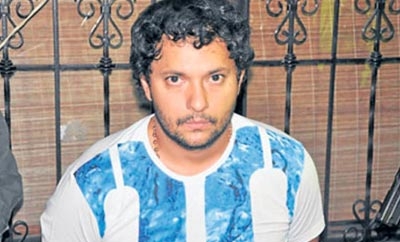Colombian police have captured the alleged head of the once-mighty Machos drug gang, in a blow to his allies in the Gaitanistas, and their campaign to push rivals the Rastrojos out of southwest Colombia.
Hector Mario Urdinola, alias “Chicho,” was hiding on a farm in the department of Meta when he was arrested by Colombia’s judicial police (DIJIN), who had been tracking him for a year and a half, reported El Tiempo.
Chicho assumed control of the remnants of the Machos, once the armed wing of the Norte del Valle cartel, after then-leader Hilber Nover Urdinola Perea, alias “Don H,” turned himself in to police in 2011.
Later that year, Chico negotiated the sale of trafficking routes in Colombia’s southwest to neo-paramilitary organization the Gaitanistas, also known as the Gulf Clan, Urabeños, and Gaitanist Self-Defense Forces of Colombia (Autodefensas Gaitanistas de Colombia – AGC), according to a report in Cali newspaper El Pais.
The sale allowed the AGC to gain a foothold in the Valle del Cauca region — a major drug trafficking hub — sparking a violent turf war with their main rivals, drug gang the Rastrojos.
Although the Rastrojos have been severely by weakened by the loss of key leadership figures over the last year, the violence has continued, and, according to La Semana, Chicho and his associates are believed to have been responsible for much of it, including the high profile killing of Lorena Henao Montoya — “the widow of the mafia.”
InSight Analysis
While the sale of the Valle del Cauca plaza to the AGC essentially marked the end of the Machos as an independent criminal organization, it appears Chicho used the backing of the AGC to increase his personal power and influence in the region, and remained a major player in the Valle del Cauca underworld.
According to Semana, Chicho had been working closely with traffickers known as “Martin Bala” and “El Negro Orlando,” to exterminate the remnants of the Rastrojos and seize control of the trafficking routes and properties left by the Rastrojos’ decimated leadership. In 2012, leader Javier Calle Serna, alias “Comba,” surrendered to the authorities, and Diego Perez Henao, alias “Diego Rastrojo,” was arrested in Venezuela.
All three have long-established ties to organized crime in the region, and their dispute with the Rastrojos dates back to the break-up of the Norte del Valle cartel.
The newcomers in this regional territorial dispute — the AGC — may suffer from his arrest as they have lost a key local contact. However, with the Rastrojos in disarray and the Urabeños in the ascendancy, it may also free the way for them to assert their own control, without having to share power and profits with local partners.

